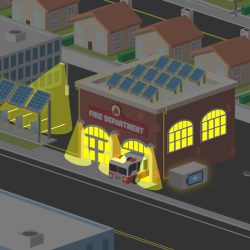The World Business Academy, in partnership with the contractor we selected, the Clean Coalition, has been building support for the Montecito Community Microgrid Initiative (MCMI), a project featuring three “behind-the-meter” critical facility microgrids located at the Montecito Fire District (MFD), Montecito Water District (MWD), and Montecito Union School (MUS) in Montecito’s Upper Village.
To date, the MFD microgrid design is almost finalized and pending approval, The MWD microgrid design is underway and on November 20th, the MUS District issued a Request for Proposals (RFP) to build solar parking canopies and rooftop systems at MUS that include electrical staging for electric vehicle charging infrastructure (EVCI). Clean Coalition anticipates that the MWD and MUS design will be completed a few months following completion of the MFD design. To help cover initial capital costs and secure a finance partner for the three projects, the Academy raised $749,617 as part of a local philanthropic resilience fund.
As designed, these microgrids will cover more than just the 10% most critical loads 100% of the time and will be capable of serving more load over shorter periods as shown in the graph below. Additionally, the savings from energy generated on-site will help pay for overall system cost.
It should be noted that while progress has been made on these critical facilities, the end goal of the MCMI initiative is to modernize the common distribution circuit so that power can be shared among all interconnected properties at both the Upper Village and Coast Village areas. For example, the potential generating capacity at MUS is much higher than its actual power consumption (a.k.a. “load”). A modernized distribution circuit would allow the MUS site to be developed to its full capacity so excess energy can be exported to the FD and WD sites, allowing them to run at full capacity during extended outages or periods of low production (think “May Gray” and “June Gloom”).
Unfortunately, Southern California Edison has not been fully cooperative in this effort, and it will take substantial political movement at the state level to change the status quo. To advance the interests of local communities, Bob Perry at the Academy is working with a team of policy analysts at The Climate Center, Clean Coalition, and other organizations to develop Advanced Community Energy (ACE), a collaborative state program to bring communities, utilities and regulators together to make energy part of the general planning process. Under ACE, utilities would be incentivized using performance-based rates (PBR) to design and operate modernized distribution grids that will enable widespread development of distributed energy resources (DERs).
By raising awareness of power resiliency issues to utility ratepayers like you and me, the threat posed by public safety power shutoffs (PSPS) will help advance local energy projects like MCMI. We need to take this opportunity to forge new regulations and rate tariffs that will incentivize widespread development of local energy resources in order to prevent massive economic loss while also generating jobs and revenue within the local economy. To reach this point, consumers (and potential generators) of energy must exercise our rights as citizens to bring utilities and local communities to the table as equals in planning a new, distributed energy future.
For more information, contact Bob Perry at bob@worldbusiness.org

